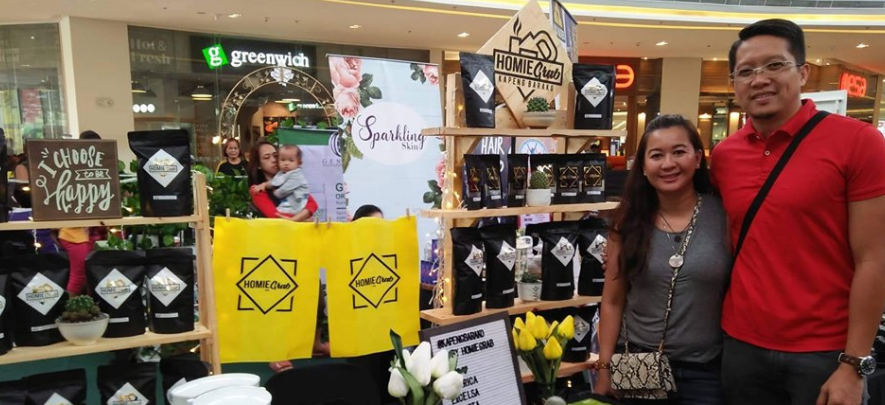How this mompreneur juggles a full-time job and side-hustle to support local farmers

SME Inspirations
298 week ago — 7 min read
Enterprise: Kapeng Barako by HomieGrab
Founder: Janice Berte
Industry: Food & Beverage / Fresh, Packaged, and Processed Food
Year it was founded: 2019
Location: Cainta, Philippines
Managing a business while having a full-time job and raising kids at the same time is not a walk in the park. But Janice Berte, the owner of Kapeng Barako by HomieGrab, gets her strength from the community where they source their product: the coffee farmers.
What started as a way to give back and help the community of coffee farmers, Kapeng Barako by HomieGrab has now both local customers and as well as international ones in countries like Singapore and Australia.
In conversation with UnionBank Globallinker (GL), Janice Berte shares how she juggles her role as a mom and a sales manager while managing her business.
Also read: Run your business like a boss: The new mom's survival guide
GL: How did you start your business?
JB: My husband and I started our business in 2017 as a sideline because we are both working. This year, we established Kapeng Barako by HomieGrab. My husband is from Lipa, Batangas. We were in our house in Batangas when a coffee farmer approached us. He asked us if we wanted to buy coffee beans. We thought it was just a pack of coffee. But we found out when he came to our house that he is doing this so to support his child’s tuition fee. Hearing this, it was hard for us to say no. He offered 100 kilos of coffee beans. But for us, where were we going to use that 100 kilos?
Since my husband and I are both coffee lovers – we try every kind of coffee - we decided to start a business out of it. We’d been planning about this for a very long time but we are both busy with our work. We took the courage on how to sell and market it. Of course, there are a lot of factors you need to consider. You have to invest in roast equipment. For a start, you need to go to the roaster and see how they roast it. Little by little you learn how to do it.
GL: You love coffee, but you don’t have a background about doing coffee business. How did you equip yourself?
JB: You need to learn and know your product well. There should be a process. Personally, I studied how to roast beans. I attended a seminar about proper packaging organized by the Department of Trade and Industry which really helped me a lot.
It’s not just about your desire to have a business; you should study it. There should be proper education or training.
GL: What’s your motivation behind your business?
JB: Our inspiration is our community of coffee farmers. We are not rich, but this is how we can give back in our own little way. The farmers used to borrow money from loan sharks. Usually, their income only goes to pay their loan. We are happy whenever we buy coffee from them. They are also happy because they are no longer borrowing money. We were able to build relationships and trust with our farmers. We are helping them to elevate their lives. For me, to help others is priceless. You teach them how to fish. You give them a source of livelihood so they can generate income.
GL: How do you market your product?
JB: We make sure it’s affordable so everyone can buy it. We are proud of our products and we even invite people to visit the farm. We also package it nicely. We offer grounded coffee and beans. We have different types of beans – three class of beans and experimented creating house-blend coffee.
We started from selling it to our friends and we also offer co-branding. If you want to have a coffee business, we will package it for you with a minimum order.
GL: How did you manage your work and your side business?
JB: It’s really because of our partnership as a couple. If I’m not free, my husband is the one who handles it. I don’t need to tell it to him. Like what they say, it takes two to tango. You should be hand-in-hand to help each other in the business. During weekends, I used to do the tasks for our business. We also have workers who help us with the business.
Also read: How to manage your business while having a regular job
GL: What are your milestones so far?
JB: We have customers from Singapore and Australia. Locally, more people are co-branding with us. That’s fine with us as long as they are sourcing the coffee from us, and that we can continue to order more beans from the community.
Our inspiration is our community of coffee farmers. We are not rich, but this is our way to give back in our small ways. We are helping them to elevate their lives.
GL: What are your tips for people who are working while doing their side-hustle?
JB: You need to manage your time. Set your priorities. I don’t want to say that this business is a less priority. But because I’m engaged in a company, I need to give back on that. If you manage it during weekends or after working hours, then there’s an extra income for you. So don’t be afraid to grab something different.
You need to do what you really love to do. If you work on your turf, like for me, I love coffee and I want to help others, you will be encouraged. It’s like your vitamins to keep you going.
GL: How does UnionBank Globallinker help your business?
JB: I joined UnionBank Globallinker last year. I’m very thankful for this platform that UnionBank has built for SMEs. It’s a chance to showcase our products to the Asia Pacific – India, Thailand.
Also read: 6 ways to grow your business with UnionBank Globallinker
GL: What is your message for everyone to support local coffee?
JB: Our coffee farmers would often say that they are already happy when there’s a food on the table. They are very hardworking so we should not belittle them but encourage them instead. Because if all our old coffee farmers die, who will produce our coffee? If there’s no more coffee in the world, what will happen next? Come to think of it, the coffee industry is a big industry that we can culture and innovate.
GL: You’re a mom with a full-time job and a side business? How do you manage that?
JB: I involve my kids in this business. Sometimes if we have urgent orders, my kids help me with the packaging. If you get them involved and they understand what you do, it will be easier. While they are still young, you teach them how to do business, but you need to know what’s really right for you. The right business for me, might not work for you.
Also read: 3 practical tips to survive mompreneurship
To explore business opportunities, link with Janice Berte by clicking on the 'Connect' button on her profile
Disclaimer: This article is based solely on the inputs shared by the featured members. GlobalLinker does not necessarily endorse the views, opinions & facts stated by the members.
Network with SMEs mentioned in this article
View GlobalLinker 's profile
Most read this week











Comments
Share this content
Please login or Register to join the discussion